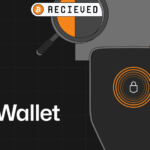In this article, I will talk about the Best Defi Wallets and their distinctive features that make them good for decentralized financing.
If you are looking for the best security, ease of use and integration with various blockchains, then these wallets provide a safe and efficient means of interacting with decentralized apps and managing your crypto assets.
Key Point & Best Defi Wallets List
| Wallet | Key Feature |
|---|---|
| MetaMask Wallet | Ethereum and ERC-20 token support, decentralized apps (dApps) integration |
| Trust Wallet | Multi-cryptocurrency support, integrated Web3 browser |
| Zengo Wallet | Biometric authentication, non-custodial and secure |
| Phantom Wallet | Focused on Solana, fast and easy to use |
| Ledger Wallet | Hardware wallet, strong security, supports multiple coins |
| Trezor Wallet | Hardware wallet, excellent security features |
| Coinbase Wallet | Easy to use, supports Ethereum-based assets, dApp browser |
| SafePal Wallet | Affordable, supports hardware and mobile solutions |
| Xverse Wallet | Focused on Web3 apps, built for the Bitcoin Lightning Network |
| Leather Wallet | Physical wallet for storing cryptocurrency keys securely |
1.MetaMask Wallet
One of the leading DeFi wallets is MetaMask wallet. The reason why it is referred to as a DeFi wallet is that, users are able to interact directly with decentralized applications (dApps) and manage Ethereum based assets without being dependent on a central authority.
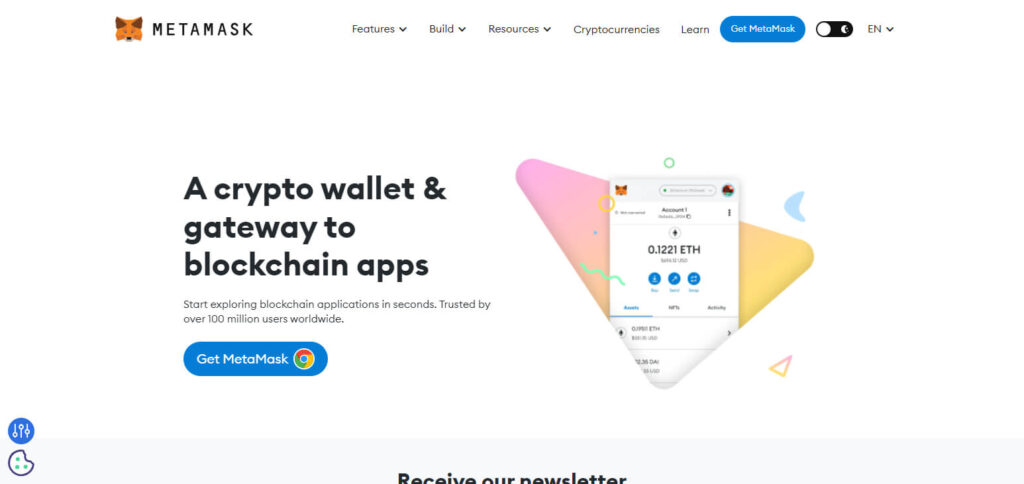
MetaMask remains unique in its integration into Ethereum blockchain which enables transactions such as staking, lending, and token swapping within the decentralized environment.
It is open source and allows for secure storage of private keys which makes it an ideal choice for users who want to explore and participate in DeFi platforms.
Pros & Cons MetaMask Wallet
Pros :
DApp integration: MetaMask ensures smooth access to dApps by making it easy for Ethereum blockchain users to engage with other networks.
User autonomy: This guarantees they can act on their own behalf and keep the security of private keys while controlling assets.
Broad applicability: It works not only with Ethereum but also other ERC-20 tokens in DeFi areas such as staking and token swaps.
Cons:
Browser extension risk: Besides being a browser wallet, it is open to online scams and browser vulnerability.
Complicated for beginners: The beginners may feel overwhelmed because of the DeFi feature as well as the interface especially when they don’t have prior experience.
Limited Support: Troubleshooting with MetaMask can be challenging due to limited support options which often depend on community forums.
2.Trust Wallet
Trust Wallet, a favorite DeFi wallet. Trust Wallet is labeled as a DeFi wallet as it allows customers to have full control of their private keys which ensures that they can securely interrelate with dApps from different blockchains.
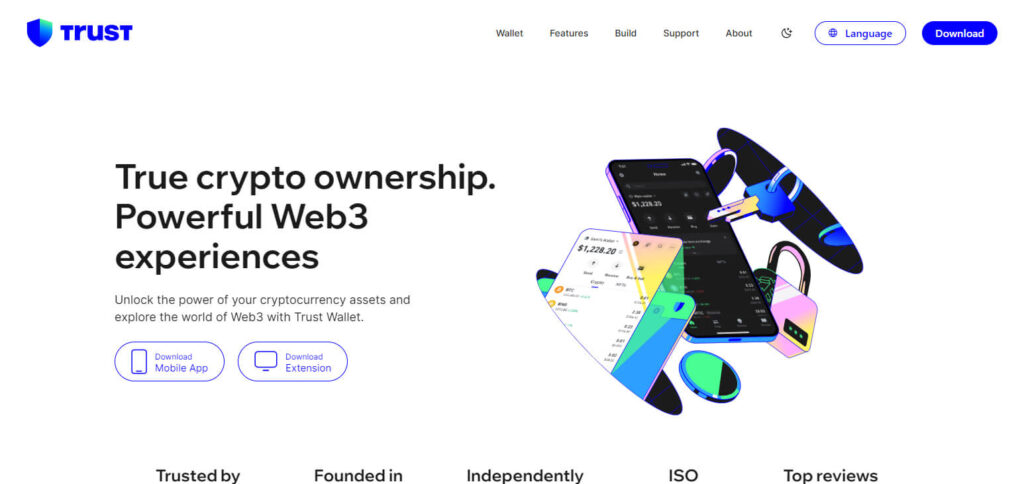
And also it combines well with the wide range of cryptocurrencies therefore versatile for users partaking in DeFi activities such as staking, yield farming, and token swapping.
The most peculiar thing about this wallet is its built-in Web3 browser facilitating direct access to DeFi platforms hence making them more smooth and decentralized without relying on external platforms.
Pros & Cons Trust Wallet
Pros :
Multi-Currency Support: Trust Wallet supports different cryptocurrencies, making it a suitable choice for people taking part in various DeFi activities on different blockchains.
Built-in Web3 Browser: It has an embedded browser that allows users to access decentralized applications (dApps) thereby making it possible to interact with DeFi platforms smoothly.
User-Friendly Interface: With its uncomplicated and intuitive design, it is accessible even to beginners.
Cons:
Security Concerns with Mobile Devices: Smartphones are prone to malware as well as phishing attacks hence this mobile wallet is not an exception.
Lack of Hardware Integration: Owing to the level of security provided by hardware wallets, Trust Wallet can be inappropriate for individuals with substantial DeFi investments.
Limited Customer Support: The primary means through which customer issues are resolved in Trust Wallet is via community-driven support which may sometimes take longer time before resolution occurs due to the same reasons.
3.Zengo Wallet
Security and user-friendliness are the top priorities in the design of Zengo Wallet, a decentralised finance wallet. One thing that makes Zengo different from other DeFi wallets is it combines private key security with state-of-the-art biometric authentication technology that eliminates seed phrases.
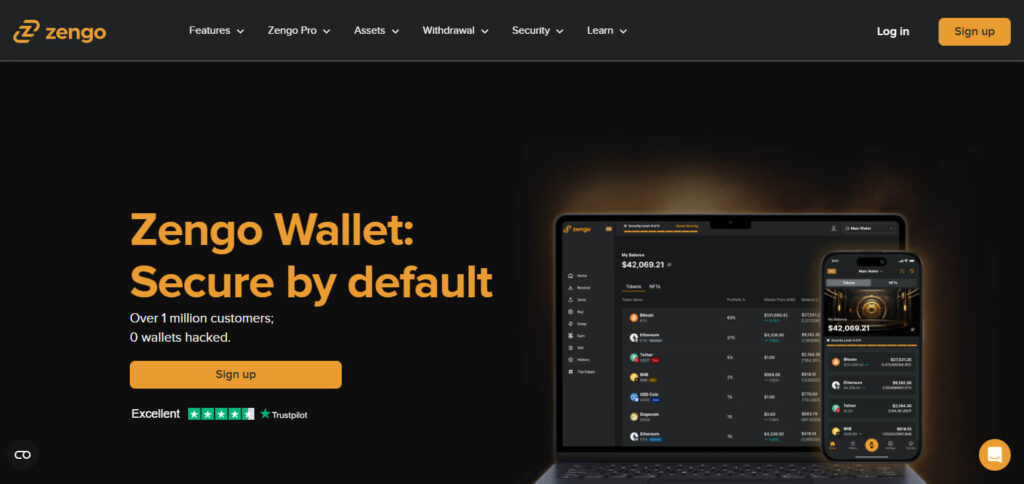
The special feature of this technology is that your keys are divided into pieces using multi-party computation (MPC) technique which further fortifies them against hacking attacks.
This easy-to-use platform has integrated well with DeFi protocols allowing users to manage their crypto assets safely while engaging with DApps hence making it an excellent choice for a secure and efficient Defi wallet experience.
Pros & Cons Zengo Wallet
Pros:
Biometric Security: Access to Zengo is safe using biometric authentication and multi-party computation (MPC) technology, hence the absence of seed phrases.
User-Friendly: The wallet has a simplistic user interface making it perfect for both beginners and experienced DeFi users.
Non-Custodial: Zengo allows its users to maintain full control over their private keys while maintaining secure protocols.
Cons:
Limited Blockchain Support: Since it mainly supports Ethereum and some other popular coins, this could be limiting for users who would like to interact with more DeFi platforms.
No Hardware Option: This can pose a security risk for those who prioritize offline storage because unlike hardware wallets, Zengo does not offer an offline option.
Subscription Fees: Users looking for completely free solutions may not be interested in paying subscription costs that come with premium features on Zengo.
4.Phantom Wallet
Phantom Wallet, a decentralized finance (DeFi) wallet specifically built for Solana blockchain. DeFi wallets are not all the same, and Phantom does not fall under the common category.
Instead, it is well suited to Solana’s and ensures that users experience swift and cheap interactions with dApps as they also manage their assets.

This seamless integration with Solana means that people can swap tokens or stake through staking mechanisms set by projects without leaving their wallets.
One of its kind characteristics of the Phantom Wallet is its user friendly interface that allows even novice defi traders while maintaining strong security measures to suit professionals.
Pros & Cons Phantom Wallet
Pros:
Optimized for Solana: Phantom is designed to work very well with the Solana chain and it supports faster and cheaper transactions that are used by DeFi on this blockchain.
User-Friendly Interface: It has a design which is easy to use; hence, making it suitable for beginners and experienced users in DeFi markets.
Built-in dApp Support: Phantom can be combined with decentralized applications so that consumers can deal directly with Defi platforms.
Cons:
Limited Blockchain Support: The major drawback for using phantom wallet is the limitation of its support to primarily Solana only- thus limiting its application among users involved in DeFi activities on other blockchains such as Ethereum or Binance Smart Chain.
No Hardware Wallet Integration: Unlike hardware wallets, offline storage isn’t available on phantom, making it prone to online threats thereby putting your assets at risk.
Occasional Network Congestion: Users may experience congestion during peak hours due to specific features of the Solana network causing delays in transaction time and high fees paid by users.
5.Ledger Wallet
Ledger Wallet is the best when it comes to safe DeFi transactions. Ledger, for instance, is a decentralized finance wallet due to its capacity of handling private keys offline and thus providing highly secure mechanisms for users to interact with dApps without losing the control over their assets.
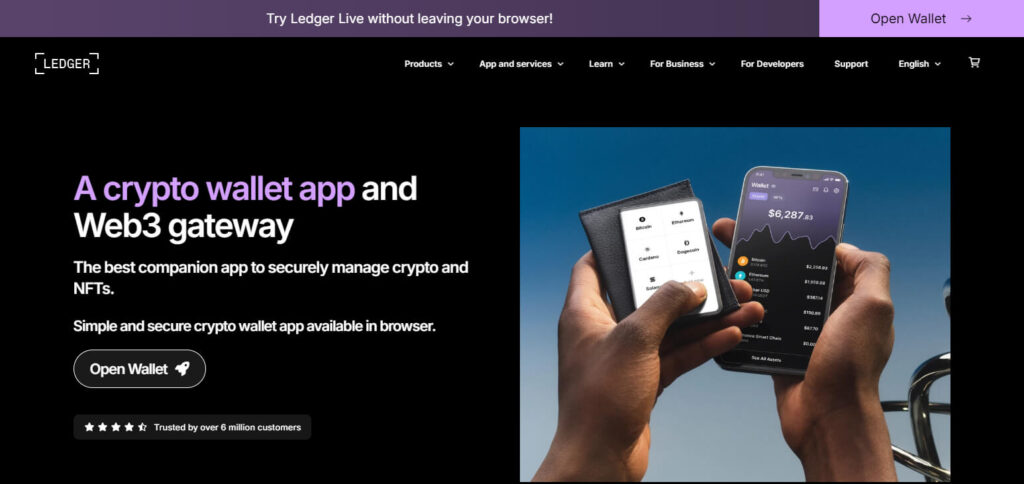
The approach taken by this hardware design helps in ensuring that they are able to sign transactions and manage their crypto assets in a manner which shields them from online harm.
Therefore, what makes it stand out is that it has incorporated hardware-level security with support for multiple DeFi platforms so as to ensure both security and flexibility for DeFi enthusiasts.
Pros & Cons Ledger Wallet
Pros:
Top-level Security: Ledger has the highest security level and enables you to store a cryptographic private key in an offline environment.
Supports Many Currencies: This makes it possible for one to use many cryptocurrencies across various DeFi platforms, and hence it is a good choice for anyone who participates in multiple blockchain ecosystems.
DeFi Compatibility: It is designed to work seamlessly with decentralized applications (dApps) thereby enabling their safe engagement in DeFi protocols such as staking and lending.
Cons:
Physical Device Needed: In order to have access, they would need the hardware device which may be less convenient than software wallets.
Can be Difficult for Newcomers: First setup can be challenging as well as dealing with dApps especially when someone doesn’t have any idea about hardware wallets or DeFi.
No Mobile App Support: Although Ledger may work on mobile devices via third-party apps, there is no actual app from the company that deals with management of DeFi activities straight through smartphones or tablets.
6.Trezor Wallet
Trezor Wallet is not only a DeFi wallet, but it is also one of the most secure hardware wallets. This wallet is categorized as a DeFi wallet since it lets you interact with decentralized applications (dApps) directly while having your private keys stay off-line which adds an extra layer of security when dealing with DeFi transactions.
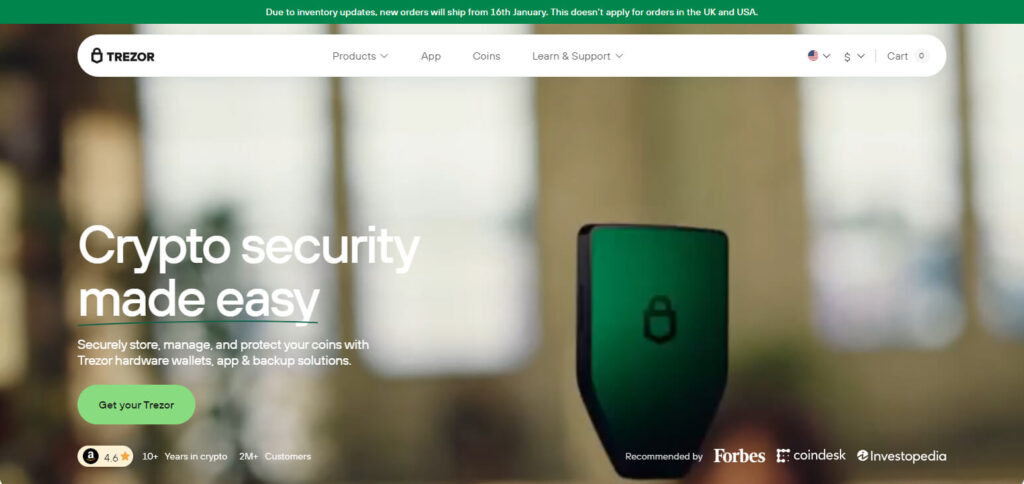
Since its design is that of a hardware wallet, assets maintained in this form cannot be exposed to cyber risks and hacking threats.
What distinguishes Trezor is its wide range of chain and platform compatibility for DeFi. With Trezor, you will be able to handle many different cryptocurrencies on various blockchains and participate in things like staking or lending on various DeFi platforms fearlessly.
Pros & Cons Trezor Wallet
Pros:
Intense Security: With Trezor, your private keys are stored on a hardware device and therefore completely secure from any online hacking attempts when you use it for DeFi activities.
Supports Various Currencies and dApps: Trezor works with several cryptocurrencies and integrates with many decentralized applications (dApps) which means that the interaction of DeFi is smooth.
Backup and Recovery Options: For instance, if a user loses their Trezor device or it gets destroyed, then there are measures put in place by the company to ensure that they can retrieve their funds.
Cons:
Costly: This can be quite expensive when compared to software wallets which may not be suitable for users with small portfolios.
Needs Physical Device: Transaction signing and access to assets requires the physical device unlike software wallets which could pose inconvenience challenges.
Steep Learning Curve: Beginners might find it difficult to set up initially, as well as use for those who are using DeFi platforms for the first time in their lives.
7.Coinbase Wallet
Coinbase Wallet, is a decentralized finance wallet designed in a user-friendly manner to empower individuals within the cryptocurrency sector.
Coinbase Wallet is defined as a DeFi wallet since it allows users to store and manage their private keys without intermediaries (Coinbase, n.d.). This enables them to have full control over their assets while interacting with decentralized applications (dApps).
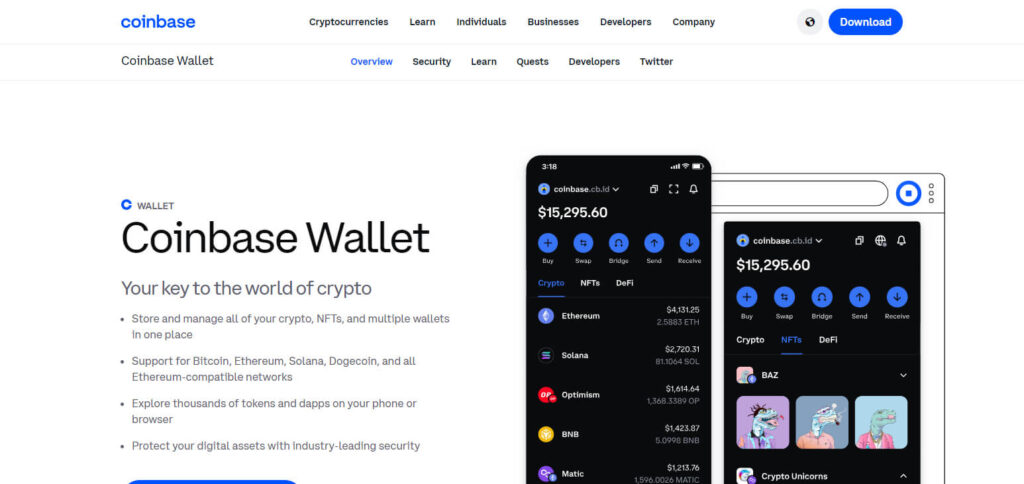
One of its unique features is that it has seamless integration with Ethereum and other blockchains, making users able to reach various DeFi platforms.
Besides, Coinbase Wallet provides simple ways of managing assets and executing decentralized transactions thus can be used by beginners as well as experienced Defi enthusiasts.
Pros & Cons Coinbase Wallet
Pros:
User-Friendly Interface: Coinbase Wallet’s user interface is intuitive and simple, making it great for newcomers who would like to try out DeFi.
Wide Blockchain Support: It can be used in many blockchains such as Ethereum and Solana allowing users to access various DeFi platforms and tokens.
Integrated with Coinbase Exchange: It provides a seamless connection with Coinbase Exchange, enabling easy fund transfers between wallets and exchange accounts.
Cons :
Not Fully Anonymous: This requires personal information including your name and a valid coinbase account which might not go down well with people looking for complete anonymity in their defi transactions.
Limited Security Features: Though being safe, the offline storage or extensive security features that hardware wallets provide are not available on Coinbase Wallets.
Fees for Transactions: Transaction charges may be higher than those incurred by direct decentralized network access wallets without intermediaries.
8.SafePal Wallet
The SafePal Wallet, a versatile decentralized finance (DeFi) wallet that comes with both mobile and hardware solutions. It is DeFi wallet because it allows users to control their private keys securely when interacting with dApps on several blockchains.

What makes it unique is its cost effectiveness, safety, and versatility as seen in the low cost and ease of use for its hardware wallet option while also providing a mobile app which supports various DeFi protocols.
With the ability to store numerous cryptocurrencies and tokens as well as providing secure offline storage medium for users, this tool proves best in engaging with DeFi ecosystems for anyone.
Pros & Cons SafePal Wallet
Pros:
Cheap Security: To help users connect to DeFi space, SafePal offers affordable hardware and software wallet solutions.
Many Cryptocurrencies Supported: This wallet has a wide array of cryptocurrencies that can be used by clients to manage different assets across various blockchain ecosystems.
DeFi Integration: SafePal blends smoothly with DeFi platforms, enabling users to enjoy decentralized financing services like staking, swapping and lending activities.
Cons :
No Integrated dApp Browser: The wallet does not come with a built-in browser like some others for easy access to decentralized applications (dApps).
The User Experience: Its interface may not be as user-friendly or polished as those of more popular wallets; this may create a steep learning curve for beginners.
Limited Customer Support: Although the customer support is community-based, which might prolong issue resolution times relative to dedicated support teams from other wallets.
9.Xverse Wallet
Xverse is the best Defi wallet that helps the users to get a seamless access of Web3 ecosystem. Xverse qualifies as a DeFi wallet because it allows users to safely store their private keys while interacting with decentralized applications (dApps) and decentralized finance protocols.
Its major standout attribute is its inbuilt compatibility for the Bitcoin Lightning Network, which enables one to take part in efficient low-cost transactions thus becoming an advantage in the Defi space.
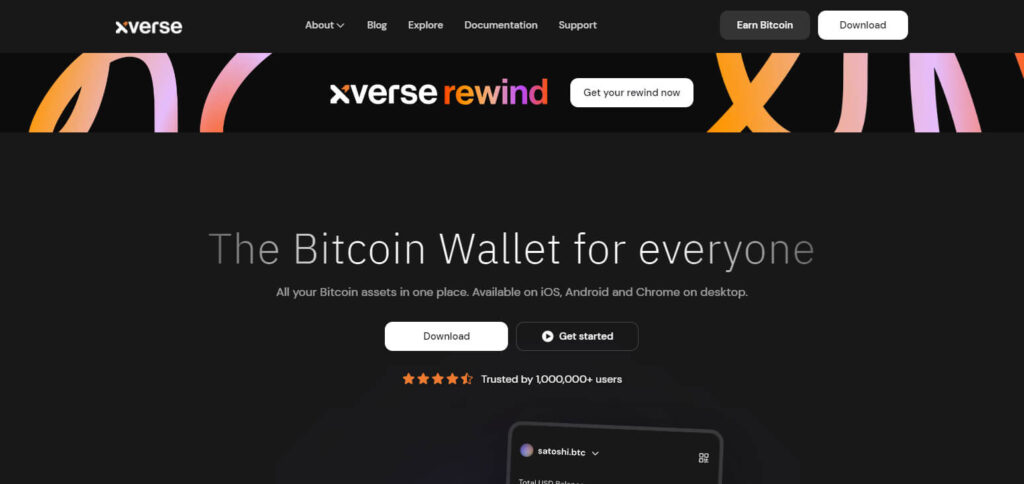
With this platform, it becomes easy and convenient for you as a user to integrate your bitcoin holdings with other blockchain networks under one umbrella through seamless integration.
This makes it suitable for people who want to use a wallet that offers wide-ranging compatibility with DeFi protocols as well as advanced transaction capabilities. DYNAMIC REWRITE
Pros & Cons Xverse Wallet
Pros:
Optimized for Bitcoin Lightning Network: Xverse Wallet is designed in such a way that it can operate with the Bitcoin Lightning Network, enabling users to transact faster and with fewer costs thus best suited for those involved in DeFi on Bitcoin.
User-Friendly Interface: The wallet has a simple layout making it easier for both novices and experts to use decentralized finance platforms.
Cross-Chain Compatibility: By supporting multiple blockchains, Xverse enables users to explore various DeFi ecosystems beyond just Bitcoin thus proving its flexibility.
Cons:
Limited to Bitcoin and Ethereum: Although other blockchains are supported by the platform, Xverse still concentrates most on Ethereum and Bitcoins hence cannot be used by individuals who majorly participate in other DeFi ecosystems.
No Hardware Wallet Integration: As a software wallet, Xverse lacks some security features found in hardware wallets that store information offline thereby making them less susceptible to hacking attacks.
Early Development Stage: Since this is a relatively new wallet, there might be some bugs or unfinished features that could result into poor user experience while using it.
10.Leather Wallet
Physical storage for cryptocurrency keys, Leather Wallet can function as a decentralized finance (DeFi) wallet too. Because it securely takes offline private keys, Leather Wallet is considered to be a DeFi wallet; thus users are shielded from cyber threats while they interact with decentralised applications (dApps).

The unique thing about Leather Wallet is that it combines an old-fashioned physical wallet design with state-of-the-art security features, ensuring that users have something tangible to hold onto and secure recover their assets.
Although it does not directly link up with dApps like other digital wallets do, still this is a must-have tool if you want to take charge of your DeFi activities in a safe and offline manner.
Pros & Cons Leather Wallet
Pros:
Physical Security: Leather wallets provide an offline, traditional way to securely hold private keys and protect them from digital threats like hacking or phishing attempts.
Sturdy and Portable: Made of leather material, a strong and elegant design is offered which can be advantageous for users of crypto who want to carry their keys around in a tangible format.
No Internet Exposure: Offline nature of leather wallets makes them immune to the online security risks that are faced by digital wallets.
Cons:
Limited Functionality: DeFi platforms or decentralized applications (dApps) cannot directly interface with leather wallets, therefore making it less suitable for active DeFi participants.
Risk of Physical Loss or Damage: It can be damaged, lost, or stolen as it is a physical wallet, leading to permanent loss of cryptocurrencies.
Lack of Backup Options: Unlike digital wallets, there are no easy ways to back up or recover leather wallets; hence it’s hard to get your assets back if you lose the wallet.
Conclusion
The top DeFi wallets available and discussed their unique features that cater for various user needs.
Among the hardware options are Ledger and Trezor, which offer high levels of security, while MetaMask, Trust Wallet and Coinbase Wallet are mobile-friendly wallets that score highly in terms of ease of use, as well as dApp integration.
Whether you are a beginner seeking simplicity or an experienced DeFi user desiring advanced functionalities; these present pieces provide safe as well as efficient means to supervise and interact with decentralized finance platforms.
The choice of a DeFi wallet that suits your need primarily depends on issues such as security, accessibility, and the blockchain ecosystem from where your transactions will be conducted.






